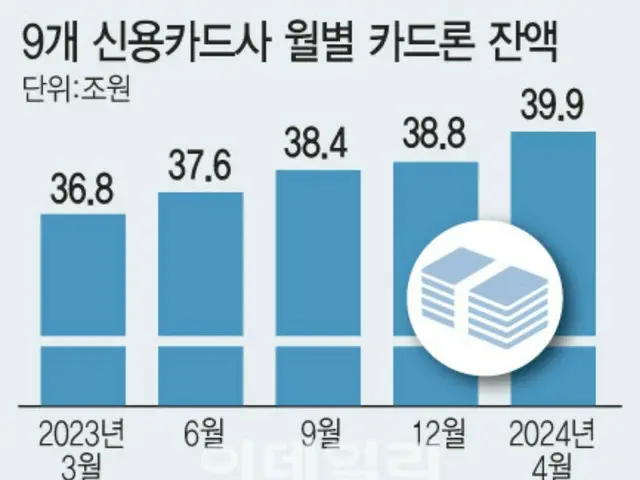The outstanding balance of repaid loans used by borrowers who were unable to make payments also increased by about 600 billion won (about 68.8 billion yen) in one year, raising concerns about credit insolvencies among card companies.
According to the Credit Finance Association, as of the end of April this year, credit card companies such as Shinhan, KB Kookmin, Samsung, Lotte, Hyundai, Hana, Woori, and BC Card had
The total outstanding loan balance of the eight card loan companies was 37.206 trillion won (US$40.2 billion), up 47.94 billion won (US$5.4 billion) from the previous month.
The outstanding loan balance of card loans reached 39.9644 trillion won (approximately 4.6 trillion yen) as of the end of April this year. Card loans are unsecured loans provided to customers by card companies, not banks.
Many people use credit cards because they can easily obtain loans without going through special screening. In particular, the outstanding balance of card loans of the seven specialized card companies in the first quarter of this year was 1.744 trillion yen.
The total was calculated to be 100 million won (approximately 200 billion yen). This is a 52.3% increase from 2023 (1.1448 trillion won / approximately 131 billion yen).
This is a product that re-loans funds to those who are delinquent on their card loans. By using this, you can reduce the burden of late interest, but your credit rating will drop and the interest will become higher.
By card company, Lotte Card and Hana Card saw a sharp increase in their outstanding repayments. As of the end of March this year, Lotte Card's outstanding repayments stood at 148.2 billion won.
(US$170 million), a sharp increase of 181.4% from the previous year, while Hana Card increased 121.68% from 75.3 billion won (US$80 million) to 166.9 billion won (US$191 million) during the same period.
Other card companies are also seeing a noticeable increase. The increase in outstanding repayments is being analyzed as a result of borrowers' declining repayment ability due to the continued high interest rates and rising prices.
The increase in outstanding loans is a concern for card companies. The delinquency rate of loans is already on the rise, and this could lead to a decline in the financial soundness of card companies.
In fact, Hana Card's delinquency rate rose from 1.67% at the end of last year to 1.94% in the past three months, while Shinhan Card's rose from 1.45% at the end of last year to 1.56% in the past three months.
A source in the card industry said, "Credit card companies' repayment loans increase bad loans, so it's not a small burden," and added, "Credit card companies consider the borrower's repayment ability during the screening process.
"We are providing repayment loans, but if the size of the loan balance increases, it is likely that this will have a negative impact on the delinquency rate."
2024/05/21 07:04 KST
Copyrights(C) Edaily wowkorea.jp 107

